初英考点精讲 同课异构 106 虚拟语气【知识点微课课件】
文档属性
| 名称 | 初英考点精讲 同课异构 106 虚拟语气【知识点微课课件】 | 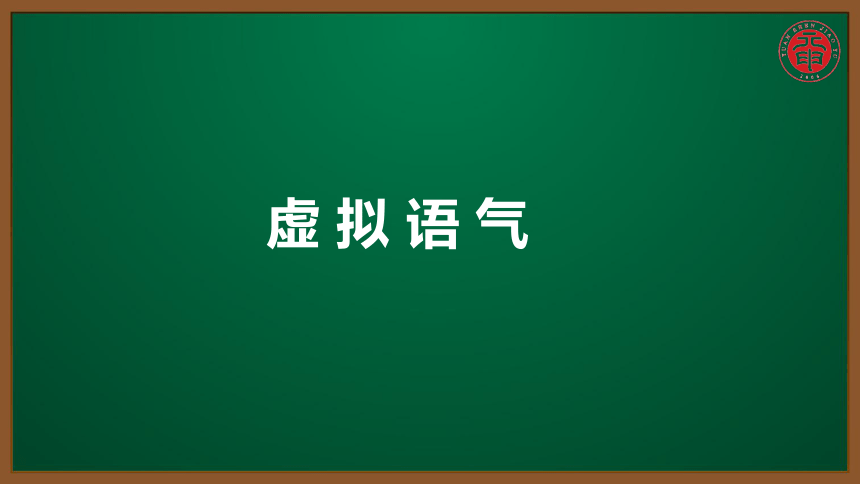 | |
| 格式 | ppt | ||
| 文件大小 | 465.0KB | ||
| 资源类型 | 试卷 | ||
| 版本资源 | 通用版 | ||
| 科目 | 英语 | ||
| 更新时间 | 2021-07-14 14:58:52 | ||
图片预览

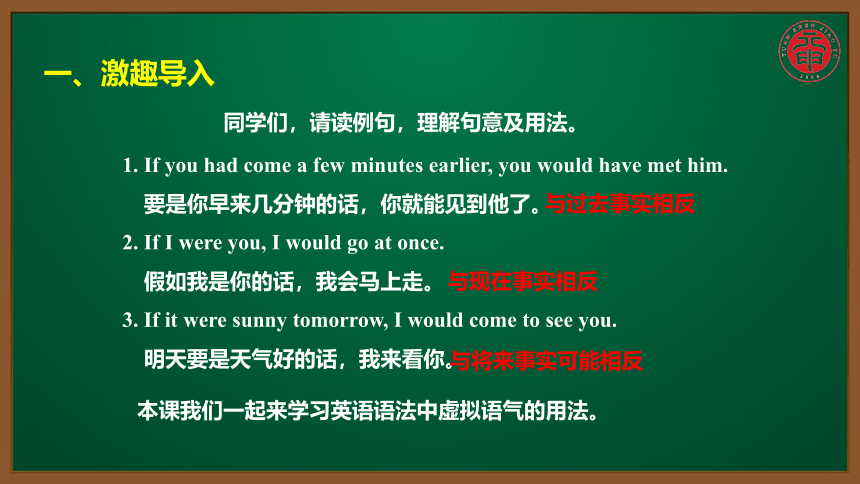
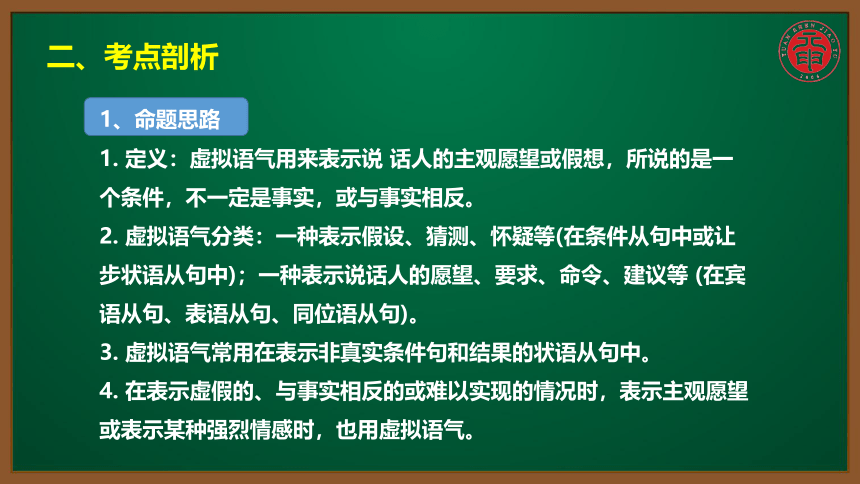
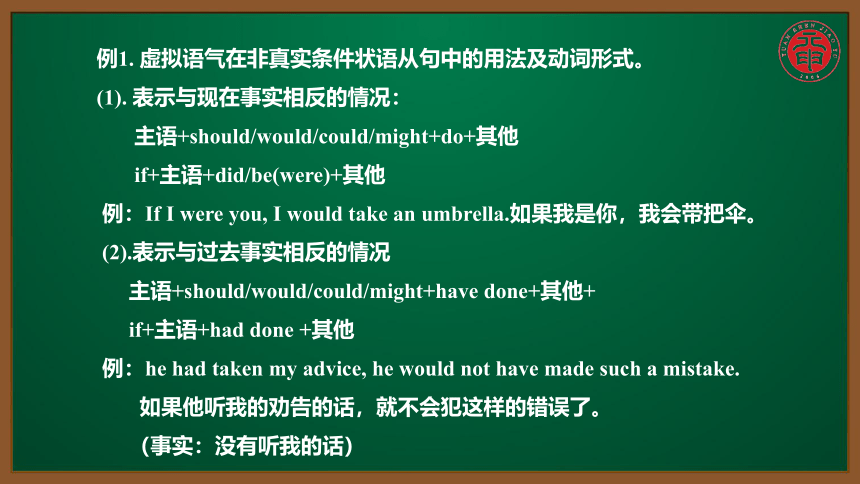
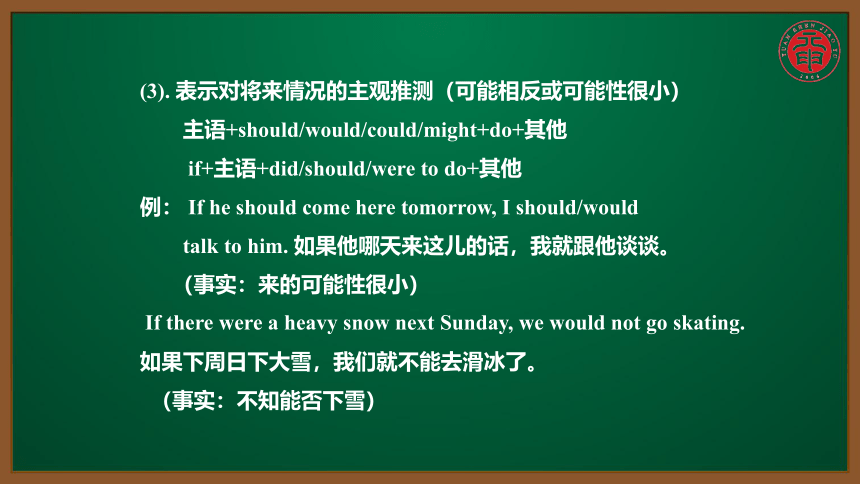
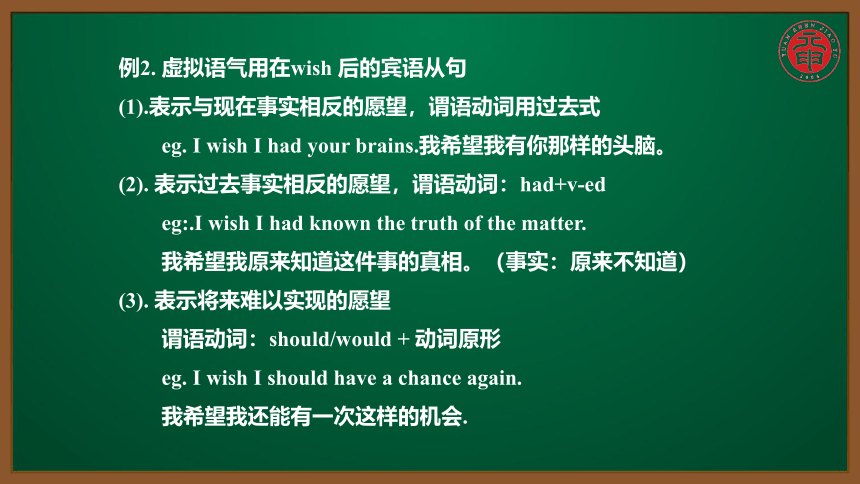
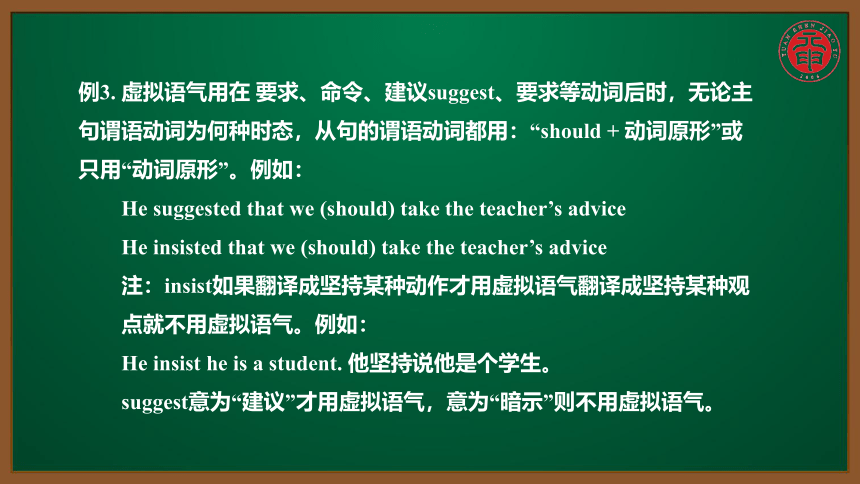
文档简介
虚 拟 语 气
1. If you had come a few minutes earlier, you would have met him.
要是你早来几分钟的话,你就能见到他了。
2. If I were you, I would go at once.
假如我是你的话,我会马上走。
3. If it were sunny tomorrow, I would come to see you.
明天要是天气好的话,我来看你。
一、激趣导入
同学们,请读例句,理解句意及用法。
本课我们一起来学习英语语法中虚拟语气的用法。
与现在事实相反
与过去事实相反
与将来事实可能相反
二、考点剖析
1、命题思路
1. 定义:虚拟语气用来表示说 话人的主观愿望或假想,所说的是一个条件,不一定是事实,或与事实相反。
2. 虚拟语气分类:一种表示假设、猜测、怀疑等(在条件从句中或让步状语从句中);一种表示说话人的愿望、要求、命令、建议等 (在宾语从句、表语从句、同位语从句)。
3. 虚拟语气常用在表示非真实条件句和结果的状语从句中。
4. 在表示虚假的、与事实相反的或难以实现的情况时,表示主观愿望或表示某种强烈情感时,也用虚拟语气。
例1. 虚拟语气在非真实条件状语从句中的用法及动词形式。
(1). 表示与现在事实相反的情况:
主语+should/would/could/might+do+其他
if+主语+did/be(were)+其他
例:If I were you, I would take an umbrella.如果我是你,我会带把伞。
(2).表示与过去事实相反的情况
主语+should/would/could/might+have done+其他+
if+主语+had done +其他
例:he had taken my advice, he would not have made such a mistake.
如果他听我的劝告的话,就不会犯这样的错误了。
(事实:没有听我的话)
(3). 表示对将来情况的主观推测(可能相反或可能性很小)
主语+should/would/could/might+do+其他
if+主语+did/should/were to do+其他
例: If he should come here tomorrow, I should/would
talk to him. 如果他哪天来这儿的话,我就跟他谈谈。
(事实:来的可能性很小)
If there were a heavy snow next Sunday, we would not go skating. 如果下周日下大雪,我们就不能去滑冰了。
(事实:不知能否下雪)
例2. 虚拟语气用在wish 后的宾语从句
(1).表示与现在事实相反的愿望,谓语动词用过去式
eg. I wish I had your brains.我希望我有你那样的头脑。
(2). 表示过去事实相反的愿望,谓语动词:had+v-ed
eg:.I wish I had known the truth of the matter.
我希望我原来知道这件事的真相。(事实:原来不知道)
(3). 表示将来难以实现的愿望
谓语动词:should/would + 动词原形
eg. I wish I should have a chance again.
我希望我还能有一次这样的机会.
例3. 虚拟语气用在 要求、命令、建议suggest、要求等动词后时,无论主句谓语动词为何种时态,从句的谓语动词都用:“should + 动词原形”或只用“动词原形”。例如:
He suggested that we (should) take the teacher’s advice
He insisted that we (should) take the teacher’s advice
注:insist如果翻译成坚持某种动作才用虚拟语气翻译成坚持某种观
点就不用虚拟语气。例如:
He insist he is a student. 他坚持说他是个学生。
suggest意为“建议”才用虚拟语气,意为“暗示”则不用虚拟语气。
例4. 情态动词+ have done
could have done 本来可以- - -might have done 本来可能 …
should / ought to have done 本来应该做 …
shouldn’t / ought not to have done 本不该做 …
needn’t have done 本不必做 …would have done 本来会去做…
didn’t need to do 没必要做也没有做 …
例如:You shouldn’t have told her the truth .
你本不应该告诉她真相。
I didn’t need to clean the windows . My brother did it.
我没必要擦窗户。我兄弟做了。
1. It is strange that the little boy _____ speak two foreign languages.
A. could b. can C. should D. would
2. He gave orders that the experiment ____ before 5:30pm.
A. be finished B. will finish C. must be finished
3.He _____ you more help, even though he was very busy.
A, might have given B. might give C. may have given
4.Without the leadership of the Party, there ____no New China.
A. would be B. has been C. should be D. was
练习一、单项选择,请选出正确的答案。
2、练一练
C
A
A
A
5. He is talking so much about America as if he _____ there.
A. had been?????????? B. has been?????????????? C. was????????????????? D. has gone
6. The young man insisted that he _____ nothing wrong and _____ free.
A. did; set?????????????????? B. had done; should be set???
C. should do; be set?? D. had done; must be set
7. Had you listened to the doctor, you _____ all right now.
A. are????? B. were?? ? C. would be??? D. would have been
8. You _____ come earlier. The bus left a moment ago.
A. would????? B. should have??????? C. may????? D. have
A
B
C
B
练习二:单项选择,请选出正确的答案.
1. If they ______ (be) here,they __________ (take) your advice.
2. If the world-war ___________ (break) out again,what ________________ (happen) to our people on earth?
3. If the policeman _____________ (be not) in that room now, it ________________ (be) very dangerous.
If I _______ (be) in your position,I _____________(ask) for teacher’s help.
If you (get) up earlier,you (catch) the first train.
were
would take
broke
would happen
were not
could be
were
would ask
had got
would have caught
3、答题技巧
用在一般虚拟条件句中的虚拟语气表示与现在、过去、将来事实相反的假设,注意时态的变化。
2. 动词wish后宾语从句中的虚拟语气主要有3种用法: 表示现在的祝愿和抱歉;表示对过去事情的遗憾;表示对将来事情的愿望。
3.在表示建议、命令、要求、忠告等动词的后面,其宾语从句的谓语用“should+动词原形”表示虚拟语气。
4.虚拟语气结构中从句和主句要根据各自发所生的时间选用符合具体时间的虚拟语气形式。
三、思维导图
3、答题技巧
用在一般虚拟条件句中的虚拟语气表示与现在、过去、将来事实相反的假设,注意时态的变化。
2. 动词wish后宾语从句中的虚拟语气主要有3种用法: 表示现在的祝愿和抱歉;表示对过去事情的遗憾;表示对将来事情的愿望。
3.在表示建议、命令、要求、忠告等动词的后面,其宾语从句的谓语用“should+动词原形”表示虚拟语气。
4.虚拟语气结构中从句和主句要根据各自发所生的时间选用符合具体时间的虚拟语气形式。
1. If you had come a few minutes earlier, you would have met him.
要是你早来几分钟的话,你就能见到他了。
2. If I were you, I would go at once.
假如我是你的话,我会马上走。
3. If it were sunny tomorrow, I would come to see you.
明天要是天气好的话,我来看你。
一、激趣导入
同学们,请读例句,理解句意及用法。
本课我们一起来学习英语语法中虚拟语气的用法。
与现在事实相反
与过去事实相反
与将来事实可能相反
二、考点剖析
1、命题思路
1. 定义:虚拟语气用来表示说 话人的主观愿望或假想,所说的是一个条件,不一定是事实,或与事实相反。
2. 虚拟语气分类:一种表示假设、猜测、怀疑等(在条件从句中或让步状语从句中);一种表示说话人的愿望、要求、命令、建议等 (在宾语从句、表语从句、同位语从句)。
3. 虚拟语气常用在表示非真实条件句和结果的状语从句中。
4. 在表示虚假的、与事实相反的或难以实现的情况时,表示主观愿望或表示某种强烈情感时,也用虚拟语气。
例1. 虚拟语气在非真实条件状语从句中的用法及动词形式。
(1). 表示与现在事实相反的情况:
主语+should/would/could/might+do+其他
if+主语+did/be(were)+其他
例:If I were you, I would take an umbrella.如果我是你,我会带把伞。
(2).表示与过去事实相反的情况
主语+should/would/could/might+have done+其他+
if+主语+had done +其他
例:he had taken my advice, he would not have made such a mistake.
如果他听我的劝告的话,就不会犯这样的错误了。
(事实:没有听我的话)
(3). 表示对将来情况的主观推测(可能相反或可能性很小)
主语+should/would/could/might+do+其他
if+主语+did/should/were to do+其他
例: If he should come here tomorrow, I should/would
talk to him. 如果他哪天来这儿的话,我就跟他谈谈。
(事实:来的可能性很小)
If there were a heavy snow next Sunday, we would not go skating. 如果下周日下大雪,我们就不能去滑冰了。
(事实:不知能否下雪)
例2. 虚拟语气用在wish 后的宾语从句
(1).表示与现在事实相反的愿望,谓语动词用过去式
eg. I wish I had your brains.我希望我有你那样的头脑。
(2). 表示过去事实相反的愿望,谓语动词:had+v-ed
eg:.I wish I had known the truth of the matter.
我希望我原来知道这件事的真相。(事实:原来不知道)
(3). 表示将来难以实现的愿望
谓语动词:should/would + 动词原形
eg. I wish I should have a chance again.
我希望我还能有一次这样的机会.
例3. 虚拟语气用在 要求、命令、建议suggest、要求等动词后时,无论主句谓语动词为何种时态,从句的谓语动词都用:“should + 动词原形”或只用“动词原形”。例如:
He suggested that we (should) take the teacher’s advice
He insisted that we (should) take the teacher’s advice
注:insist如果翻译成坚持某种动作才用虚拟语气翻译成坚持某种观
点就不用虚拟语气。例如:
He insist he is a student. 他坚持说他是个学生。
suggest意为“建议”才用虚拟语气,意为“暗示”则不用虚拟语气。
例4. 情态动词+ have done
could have done 本来可以- - -might have done 本来可能 …
should / ought to have done 本来应该做 …
shouldn’t / ought not to have done 本不该做 …
needn’t have done 本不必做 …would have done 本来会去做…
didn’t need to do 没必要做也没有做 …
例如:You shouldn’t have told her the truth .
你本不应该告诉她真相。
I didn’t need to clean the windows . My brother did it.
我没必要擦窗户。我兄弟做了。
1. It is strange that the little boy _____ speak two foreign languages.
A. could b. can C. should D. would
2. He gave orders that the experiment ____ before 5:30pm.
A. be finished B. will finish C. must be finished
3.He _____ you more help, even though he was very busy.
A, might have given B. might give C. may have given
4.Without the leadership of the Party, there ____no New China.
A. would be B. has been C. should be D. was
练习一、单项选择,请选出正确的答案。
2、练一练
C
A
A
A
5. He is talking so much about America as if he _____ there.
A. had been?????????? B. has been?????????????? C. was????????????????? D. has gone
6. The young man insisted that he _____ nothing wrong and _____ free.
A. did; set?????????????????? B. had done; should be set???
C. should do; be set?? D. had done; must be set
7. Had you listened to the doctor, you _____ all right now.
A. are????? B. were?? ? C. would be??? D. would have been
8. You _____ come earlier. The bus left a moment ago.
A. would????? B. should have??????? C. may????? D. have
A
B
C
B
练习二:单项选择,请选出正确的答案.
1. If they ______ (be) here,they __________ (take) your advice.
2. If the world-war ___________ (break) out again,what ________________ (happen) to our people on earth?
3. If the policeman _____________ (be not) in that room now, it ________________ (be) very dangerous.
If I _______ (be) in your position,I _____________(ask) for teacher’s help.
If you (get) up earlier,you (catch) the first train.
were
would take
broke
would happen
were not
could be
were
would ask
had got
would have caught
3、答题技巧
用在一般虚拟条件句中的虚拟语气表示与现在、过去、将来事实相反的假设,注意时态的变化。
2. 动词wish后宾语从句中的虚拟语气主要有3种用法: 表示现在的祝愿和抱歉;表示对过去事情的遗憾;表示对将来事情的愿望。
3.在表示建议、命令、要求、忠告等动词的后面,其宾语从句的谓语用“should+动词原形”表示虚拟语气。
4.虚拟语气结构中从句和主句要根据各自发所生的时间选用符合具体时间的虚拟语气形式。
三、思维导图
3、答题技巧
用在一般虚拟条件句中的虚拟语气表示与现在、过去、将来事实相反的假设,注意时态的变化。
2. 动词wish后宾语从句中的虚拟语气主要有3种用法: 表示现在的祝愿和抱歉;表示对过去事情的遗憾;表示对将来事情的愿望。
3.在表示建议、命令、要求、忠告等动词的后面,其宾语从句的谓语用“should+动词原形”表示虚拟语气。
4.虚拟语气结构中从句和主句要根据各自发所生的时间选用符合具体时间的虚拟语气形式。
同课章节目录
- 词法
- 名词
- 动词和动词短语
- 动词语态
- 动词时态
- 助动词和情态动词
- 非谓语动词
- 冠词
- 代词
- 数词和量词
- 形容词副词及其比较等级
- 介词和介词短语
- 连词和感叹词
- 构词法
- 相似、相近词比较
- 句法
- 陈述句
- 一般疑问句和否定疑问句
- 特殊疑问句及选择疑问句
- 反意疑问句
- 存在句(There be句型)
- 宾语从句
- 定语从句
- 状语从句
- 主谓一致问题
- 简单句
- 并列句
- 复合句
- 主谓一致
- 主、表语从句
- 名词性从句
- 直接引语和间接引语
- 虚拟语气
- 感叹句
- 强调句
- 倒装句
- 祈使句
- 句子的成分
- 句子的分类
- 题型专区
- 单项选择部分
- 易错题
- 完形填空
- 阅读理解
- 词汇练习
- 听说训练
- 句型转换
- 补全对话
- 短文改错
- 翻译
- 书面表达
- 任务型阅读
- 语法填空
- 其他资料
